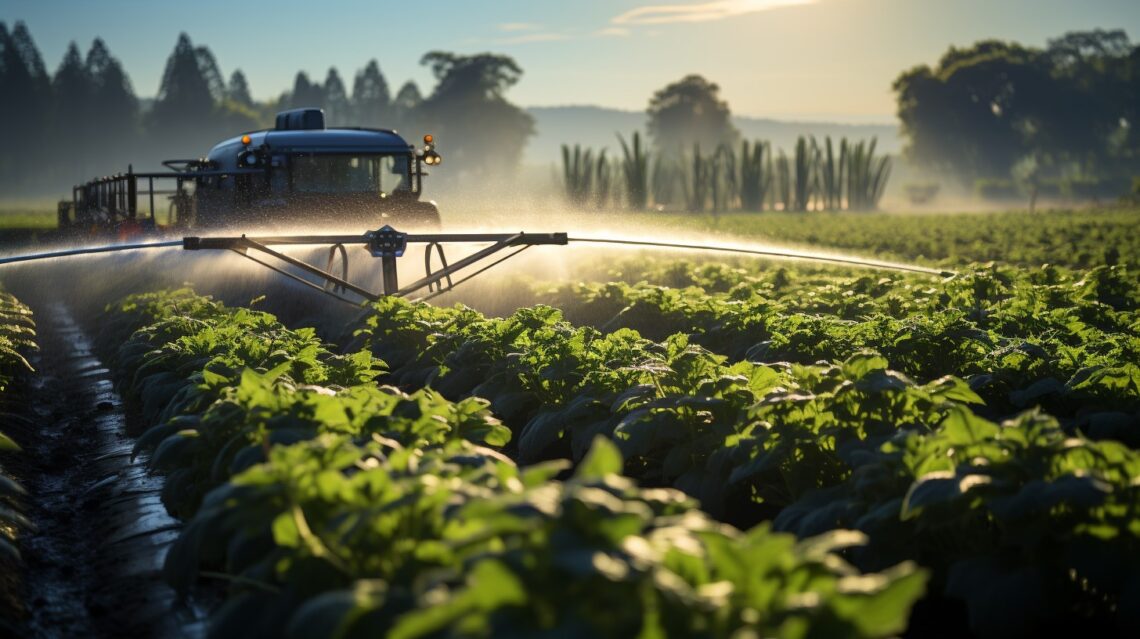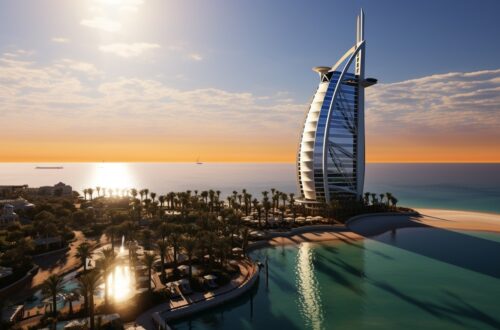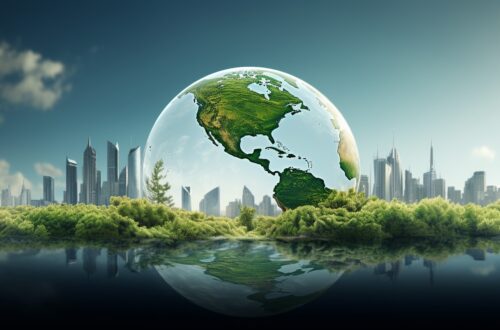Introduction to Water Conservation in Dubai
Dubai’s geographical setting in the Arabian Desert presents a unique challenge – the scarcity of freshwater resources. This challenge is amplified by the city’s rapid economic and population growth, turning water conservation into a critical component of Dubai’s sustainable development. Understanding Dubai’s water conservation approach is essential for residents and offers tourists a deeper insight into the city’s environmental commitments. Far from being a mere backdrop for luxury and leisure, Dubai’s water conservation efforts are a testament to innovative adaptation in an arid environment.
Desalination: Transforming Sea into Freshwater
One of the pillars of Dubai’s water strategy is desalination – converting seawater into potable water. As a city surrounded by the Arabian Gulf, desalination provides a substantial portion of Dubai’s freshwater needs.
Overview of Desalination Technology and Its Role in Dubai
Desalination in Dubai is not just about meeting water needs; it’s a technological marvel. The city produces freshwater using advanced desalination techniques, such as multi-stage flash distillation and reverse osmosis. These energy-intensive methods are crucial for Dubai, which needs more freshwater sources like rivers or lakes.
Innovations and Sustainability in Desalination Processes
Dubai is constantly seeking ways to make desalination more sustainable. Innovations include using renewable energy sources to power desalination plants and researching ways to reduce the environmental impact of brine disposal, a by-product of the desalination process.
Case Study: Jebel Ali Desalination Plant
The Jebel Ali Desalination Plant is a testament to Dubai’s commitment to sustainable desalination. It’s one of the most extensive desalination facilities in the world, supplying a significant portion of the city’s potable water. The plant is an example of how Dubai is scaling up its water infrastructure to meet the demands of its growing population while focusing on sustainability. Visitors can explore more about Dubai’s desalination efforts and the Jebel Ali plant here.
Water Recycling and Reuse Initiatives
Beyond desalination, Dubai has implemented extensive water recycling and reuse initiatives. These initiatives are crucial to maximizing the city’s water use efficiency.
Strategies for Wastewater Treatment and Reuse
Dubai has invested in state-of-the-art wastewater treatment facilities that convert wastewater into usable water for non-potable purposes. This recycled water is used for irrigation, industrial cooling, and landscaping, significantly reducing the demand for freshwater.
Importance of Recycled Water in Urban Landscaping and Agriculture
Recycled water is vital in maintaining Dubai’s urban landscaping, including its numerous parks and green spaces. This approach conserves freshwater and contributes to the city’s greenery, enhancing the urban environment.
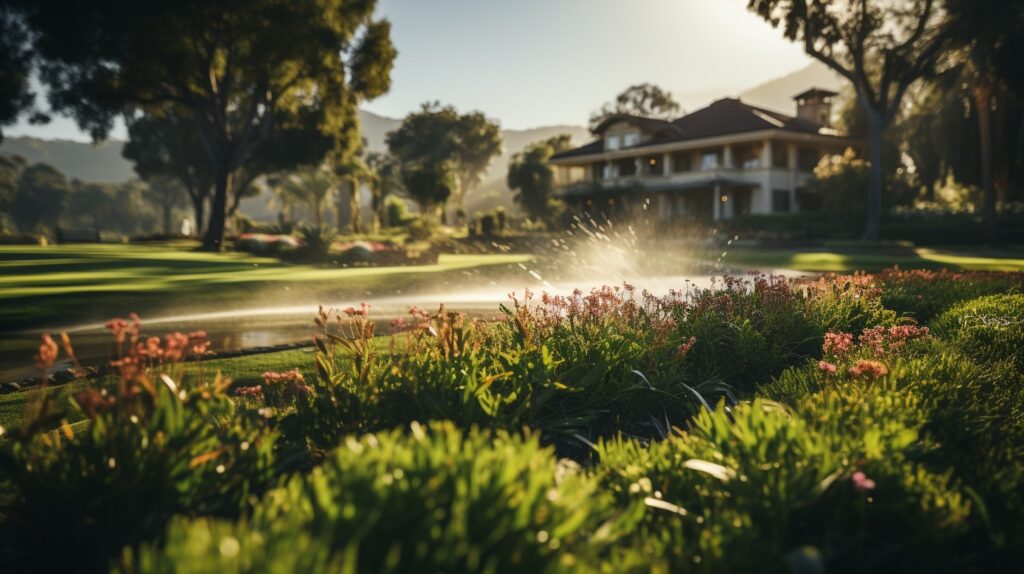
Case Study: Al Awir Wastewater Treatment Plant
The Al Awir Wastewater Treatment Plant is critical to Dubai’s water recycling efforts. It treats wastewater with advanced biological processes, producing high-quality water for irrigation and landscaping. The plant is integral to Dubai’s strategy to minimize freshwater usage for non-potable purposes.
From large-scale desalination projects like the Jebel Ali plant to advanced wastewater treatment and recycling efforts exemplified by the Al Awir facility, Dubai’s strategies showcase a commitment to sustainable water management. These efforts secure the city’s water needs and serve as a model for arid regions worldwide.
Rainwater Harvesting and Artificial Recharge Projects
In an environment where rainfall is scarce and precious, Dubai has turned to rainwater harvesting and artificial recharge projects as critical components of its water conservation strategy.
Techniques and Benefits of Rainwater Harvesting in Dubai
Rainwater harvesting in Dubai, though challenging due to the low rainfall, involves collecting and storing rainwater for reuse. This method is particularly effective for irrigation, landscaping, and other non-potable uses. The collected water is often treated and stored in underground tanks, ensuring its availability throughout the year. Rainwater harvesting reduces dependence on desalinated water, an energy-intensive and costly process.
Artificial Recharge Projects to Enhance Groundwater Levels
Artificial recharge projects in Dubai are focused on replenishing groundwater reserves. These projects involve directing rainwater and treated wastewater to recharge pits or basins where it percolates into the ground, recharging the aquifers. This helps maintain groundwater levels and acts as a buffer against years of low rainfall. The artificial recharge projects are part of a broader strategy to create a sustainable and balanced water supply system in the city.
Regulatory Framework and Policies for Water Conservation
A robust regulatory framework and comprehensive policies underpin the success of Dubai’s water conservation efforts. These regulations and policies ensure efficient water use and promote sustainable practices across all city sectors.
Government Policies and Regulations for Water Conservation
Dubai’s government has implemented various policies and regulations aimed at water conservation. These include mandatory installation of water-saving fixtures in all new buildings, rules on using treated wastewater for irrigation, and incentives for adopting water-efficient technologies in industries. The Dubai Integrated Water Resource Management Strategy is a critical policy that outlines the city’s approach to managing its water resources sustainably, emphasizing conservation, efficiency, and diversification of water sources.
Incentives and Penalties to Encourage Water-Saving Practices
The Dubai government offers various incentives to encourage compliance with water conservation measures. These include reduced tariffs and financial subsidies for implementing water-saving technologies. Conversely, penalties are imposed for excessive water usage and wastage, reinforcing the importance of responsible water consumption. These incentives and penalties are crucial for driving behavioral change and ensuring that water conservation is a shared responsibility across all sectors of society.
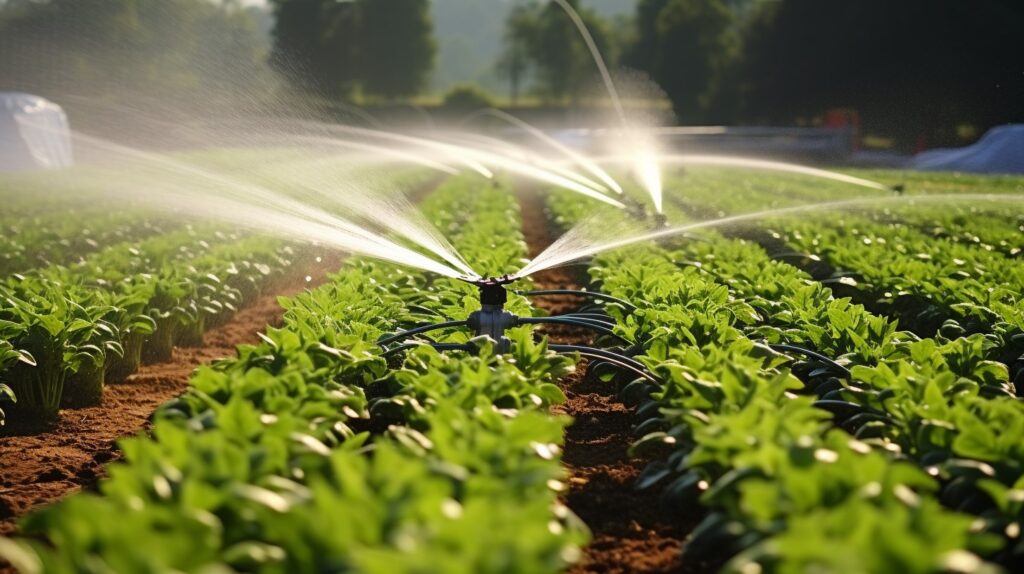
In conclusion, Dubai’s initiatives in rainwater harvesting and artificial recharge and its robust regulatory framework and policies demonstrate the city’s proactive and comprehensive approach to water conservation in its arid climate. By employing innovative techniques and strict regulations, Dubai is addressing its immediate water scarcity challenges and setting a sustainable course for the future. For tourists and residents, these efforts provide insight into how a city in one of the world’s driest regions successfully manages its water resources. The following sections of this article will further delve into the role of public awareness and educational campaigns in promoting water conservation and the ongoing challenges and future directions of Dubai’s water management strategies.
Public Awareness and Educational Campaigns
In a city like Dubai, where water is a precious commodity, public awareness and education play a crucial role in ensuring the success of water conservation efforts. The city has launched various initiatives and campaigns to educate the public about saving water and promoting sustainable water usage habits.
Community Engagement Programs and Educational Initiatives
Dubai has undertaken numerous community engagement programs and educational initiatives to foster a culture of water conservation. These programs target various segments of society, including schools, households, and businesses. For example, the Dubai Electricity and Water Authority (DEWA) regularly conducts workshops and seminars to educate residents about water-saving techniques and the importance of conserving water. These programs often include demonstrations of water-efficient appliances and tips on reducing water consumption in everyday life.
Schools in Dubai are also actively involved in water conservation education. Environmental studies are part of the curriculum, where students learn about water scarcity, the importance of conserving water, and practical ways to save water. These educational efforts are crucial in shaping the next generation’s attitude toward water conservation.
Role of Media and Technology in Promoting Water Conservation
Media and technology play a vital role in Dubai’s water conservation awareness campaigns. Social media platforms, television, and radio disseminate information on water conservation practices. Campaigns often feature infographics, videos, and interactive content to engage the public effectively. Moreover, mobile applications and online platforms provide residents with real-time data on their water usage, helping them monitor and reduce consumption.
Challenges and Future Directions in Water Conservation
While Dubai has made significant strides in water conservation, the city faces ongoing challenges that shape its future directions in this critical area.
Balancing Rapid Urbanization with Sustainable Water Management
One of the primary challenges for Dubai is balancing its rapid urbanization and development with sustainable water management. The city’s continuous growth in population and infrastructure puts increasing pressure on its water resources. Managing this demand while ensuring sustainable water usage is a complex task that requires innovative solutions and continued investment in water conservation infrastructure.
Anticipating Future Water Needs and Conservation Strategies
As Dubai looks to the future, anticipating and planning its water needs becomes increasingly important. This includes developing strategies to cope with potential increases in water demand due to population growth, urban expansion, and the impacts of climate change. Dubai will likely continue investing in advanced water technologies, such as innovative irrigation systems, water recycling, and efficient desalination processes, to meet these future needs.
Moreover, ongoing research and development in water conservation technologies will be crucial. This might involve exploring new water harvesting methods, improving desalination plants’ efficiency, and developing more sustainable landscaping practices.
In conclusion, Dubai’s comprehensive approach to water conservation, encompassing public awareness, education, and facing future challenges, highlights the city’s commitment to sustainable water management. These efforts address the immediate needs of water conservation and pave the way for a more sustainable and water-secure future for Dubai. For tourists and residents alike, understanding these efforts provides insight into the city’s dedication to preserving its most precious resource in the face of an arid climate and rapid urban growth. The city’s journey in water conservation serves as a model for sustainable urban development in arid regions worldwide.
